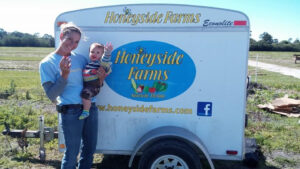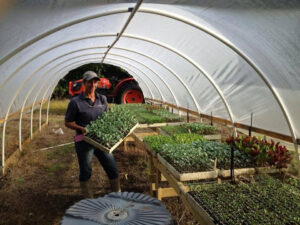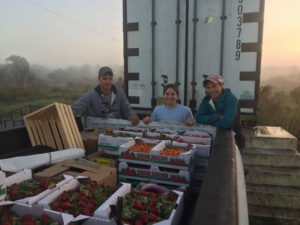The organic farm won praise and friends, but being small – and being in Sarasota – is challenging.
By Tyler Oldano
Original Air Date: June 21, 2024
Host: Agriculture has always been part of Florida’s identity. Palm trees and greenery are featured on the state flag, citrus groves dot Florida’s countryside, and every year Plant City celebrates a strawberry festival. One major part of that identity comes from the efforts of small farmers, who make up 90 percent of Florida’s agriculture. But recently, these small farms are struggling with a different type of green, the almighty dollar. Our Tyler Oldano tells us about how a 10-acre organic farm in Sarasota went out of business last week, and talked to an expert on how this could be avoided.

Tiffany Bailey. Photos courtesy Honeyside Farms
Tyler Oldano: Last week, Honeyside Farms in Sarasota made an announcement that no farm wants to make: As of June 13, they were closing for good. Honeyside had been respected by the local farming community, winning the best local farm award from SRQ magazine in both 2021 and 2023. As for why they had to close, owner Tiffany Bailey listed in a Facebook post high costs of labor, and the big fixed costs of a small farm. We tried to reach Tiffany Bailey, but were not successful before the deadline.
Farm closures are a common sight in the United States, according to a census by the Department of Agriculture: Between 2017 and 2022, the number of farms in the United States declined by 7 percent. That’s more than 140,000 farms, shutting their doors. While the drop has somewhat stabilized since, many small farmers, like Honeyside, continue to shut their doors. The question is, why?
Andrew Hudson: I think there are two or three reasons small farms have dwindled. The Number One reason is that it’s been the official policy of the U.S. government for decades to incentivize large farms.

TO: Those are the words of Andrew Hudson, who helps operate Jessica’s Organic Farm in Sarasota. He says that small farmers face a lot of challenges compared to their larger counterparts. One of them is the government itself.
AH: And they were incentivizing people to give up farming, unless they were going to expand their scale. And it partially was the Cold War. They wanted to compete with the Russians, and there were other factors. So the Number One reason is, it was the policy of the U.S. government for a long time to incentivize only larger farms.
TO: A lot of this came from a Secretary of Agriculture in the 1970s named Early Butz. Butz told farmers to quote “get big or get out” — a phrase which encouraged farmers to shift their focus to commodity crops like corn, and grow in size. There’s a problem though. Hudson says that many farmers simply don’t want to become large.
AH: Some people see themselves as a community creator, and some people see themselves as having some sort of ecological, spiritual connection to the earth. And there are probably many different ways to have an identity apart from the business, where the business is in service of this more important thing.
TO: It’s that ecological mindset that can sometimes conflict with becoming a large farmer. Another major challenge is the concept of sustainability. Small farmers sometimes go beyond the sustainability levels required by organic certifications. Hudson says, not only is it something growers want to do, but it’s something some of their local customers look for as well. He says that many small farms look at the standards and see them as the baseline. But some large farms see things differently.
AH: You can have large corporations that say we’re going to double down on only just barely meeting that standard, and forget anything else that’s green or sustainable. We’re only going to meet that standard. And then that’s how we’re going to make money.
 TO: This isn’t the only challenge small farms are facing though. Labor shortages have been a problem for the entire industry for a long time, but especially these last few years. The problem goes beyond just hiring more workers. Hudson says that the issue of labor is interconnected with so many other local issues such as housing, making it a difficult challenge to conquer.
TO: This isn’t the only challenge small farms are facing though. Labor shortages have been a problem for the entire industry for a long time, but especially these last few years. The problem goes beyond just hiring more workers. Hudson says that the issue of labor is interconnected with so many other local issues such as housing, making it a difficult challenge to conquer.
AH: Well, so we’ve had to raise our wages because some people couldn’t live where they live if we didn’t raise their wages. So that’s a cost of labor connected to the cost of housing, which is connected to cost of food — which does help us, but it also hurts us because it raises the cost of living. So, you know, we’re part of this treadmill that everybody’s on right now, with the inflation problem.
TO: Even with people to work the harvest, the fields themselves can create challenges. Extreme weather is becoming a problem for small farmers, with Hudson saying farmers must take more precautions to protect their crops.
AH: We used to only spray it in the fall, in the spring. Now we see these hot weather pests all the way through the winter. You can just look at the temperature data over the last 20 years and see that it’s gone up
TO: These are all issues that impact farms across the United States. Florida, and more specifically Sarasota, has introduced challenges on a more local scale. Sarasota is a fast-growing county with sprawling suburbs. But to farmers, that growth can come at a cost. More growth means that more areas are being zoned for housing, shrinking the available land for farms. Hudson says this practice also segregates farms from their customers, hurting the sense of community that many farmers rely upon for repeat business.
AH: It’s become clear, I think, in many regions, but especially in Florida, that we need agriculture to be happening close to where people live. And we have land-use policies that do the opposite of that. We need different land-use policies than the ones that just make Sarasota a place where it’s going to be all housing for northerners to come here with money.
TO: All of these problems and more, come together to create an environment that is hostile to local growers. So, how do you solve all these issues, and help small farmers? Hudson says that the first step is simple conversation.
AH: You get people to come to the farm, they have a feeling of connection. And when you have a feeling of connection to it, then you have more bandwidth for thinking about the kind of issues you’re asking about today. So I would like to see more farms and that have people visit. And I’d like to see more customers who are willing to visit farms.
TO: Reporting in Sarasota, Tyler Oldano WSLR.
WSLR News aims to keep the local community informed with our 1/2 hour local news show, quarterly newspaper and social media feeds. The local news broadcast airs on Wednesdays and Fridays at 6pm.